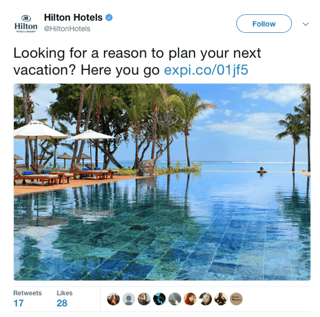<UPDATED: Hotel Marketing Trends for 2018>
Both the business and pleasure travel segments are looking up. According to Deloitte, this growth is projected to continue through 2017 and beyond. To capitalize on the strong outlook, it is important to employ every technique and strategy at your disposal, including -- and especially -- digital hotel marketing.

“The world of travel and hospitality has entered a new era of growth and transformation.” Deloitte 2017 Travel and Hospitality Outlook
Here are five of the hottest hotel marketing trends to hit the hospitality industry in 2017:
- Mobile-Ready. You can’t not go mobile. Mobile is poised to overtake desktop as the savvy traveler’s go-to tool for research and booking. About 27 percent (and counting) of online bookings are completed via smartphone. Note that, at the same time, use of tablets is steadily declining.
Mobile sites have seen an 88 percent jump in conversion rates, and mobile travel searches have grown by 25 percent from 2015. Even better, Google rewards sites that are mobile-friendly by giving them more advantageous placement in the results pages.
Bonus tip: ask your digital marketing agency to help you deploy mobile payment options; these are becoming much more popular among travelers.
- Quality Content. Today’s consumers want value before they decide to put down their money. Brands can deliver, while building trust, through relevant, high-quality content. Prague’s Hotel Josef and Maximilliam Hotel, owned by the same operating company, do this masterfully.
Creative Director Clémentine Amiraux works to create a compelling story. To this end, she oversees the creation of gorgeous videos and informative blog posts centered around what to do in Prague -- terffic for the novice and experienced traveler alike. This content “soft sells” consumers and guides them seamlessly to the hotels’ websites. They take their content strategy to the next level by cross-publishing on their websites, social media, mobile sites, and the industry’s larget media syndication network, VNetwork. As a result, they’ve doubled their website traffic, boosted direct bookings, and reduced bounce rates.
- Personalization. One asset that will help differentiate you from the competition: the personal touch. How you treat guests is paramount, and this begins online. Increasingly, people expect personalization as they book accommodations. How? You can insert qualifying questions in your booking process: why is this person traveling? Is it a special occasion (e.g. birthday, anniversary, honeymoon)? Is it a business or networking trip?
Sixty-two percent of consumers say they select, recommend, or pay more when a brand leverages their interests and personalize their experience. The how can be tricky: you have to carefully segment audiences based on these interests and deliver content tailored to them. Based on their interests, needs, location, and demographics, you can push certain content their way (software can help, as can your digital marketing agency.
You can also use personalization to welcome repeat visitors. A simple, “Welcome back, Joe!” and offers that align with specific interests can be effective in making guests feel like people, rather than numbers. Personalization can be challenging, but the efforts pay off. It yields 5-8 times the ROI, and increases sales, response rates, and brand affinity.
- Video and Images. Many people begin their vacations with a dream. A desire to get away. They take their dream a step further and look for enticing videos; they research destinations that will fulfill their need for relaxation, excitement, adventure, escape. Google estimates that 106 million of its unique monthly visitors are travelers. Sixty-five of leisure travelers and 69 percent of business travelers research online while thinking about a trip.
For leisure travelers, video is incredibly powerful: 65 percent watch videos when thinking about a trip, 48 percent when considering what type of trip to take, and 61 percent when choosing a destination.
This. Is. Opportunity.
Help them dream, think, and plan with enticing videos. Consumers place a great deal of trust in video, and further, they can elicit emotional connections. Researchers say that “mirror neurons” in the brain make us feel as though we’re really there. For example, when we read about someone swimming in the crystaline waters of the Mediterreanean, we think, “Nice.” But when we watch it, we actually experience a similar feeling of joy and relaxation. This is what you want to evoke in potential guests.
- Social Media. Take a look at this tweet from Hilton:

Are your mirror neurons firing yet? Sure, it’s not a video, but are you dreaming of sipping a tropical cocktail and worrying about nothing but applying sunscreen? This is one compelling reason hotels should invest in social media. And Hilton nails it. When a Twitter user clicks through on this post, their experience continues seamlessly on the Hilton brand website.
Marriott is another brand pumping time and energy into social. Their platform of choice is Snapchat, and they’ve created innovative initiatives to capture guest attention. For one campaign, they hired four social media influencers to “take over” the brand’s account once a month or so, detailing their travels.
Amanda Moore, senior director of social and digital marketing of loyalty at Marriott Rewards, says, “We only have a limited amount of time to capture your attention, so we felt like these influencers have such a strong presence, they’re camera-ready, they have a built-in audience to really bring those brands to life.”
Social goes beyond Facebook these days -- but Facebook is still a great platform to leverage. Best Western does a terrific job; their page is full of videos, images, great content (e.g. “3 Tips to Instantly Upgrade Your Memorial Day Trip,” “5 Amazing Museums That Will Keep Your Kids Learning All Summer,” “10 Reasons Why AAA/CAA Isn’t Just for Road Trippers”), and special offers (e.g. Countdown to Savings).
The point: you can use social media in many different ways. Find out where your target audience is and what they’re interested in; then be there, guiding the conversation.
Small -- and Mighty
In this article, we have mentioned brands like Hilton, Marriott, and Best Western. This emphatically does not mean that small hotels are out of the game. In fact, big companies may be playing on their fields now.
According to Deloitte: “Healthy booking growth is projected to continue across the leisure and business fronts in 2017, but the spoils are not guaranteed to travel’s biggest or most-well-known brands. The past few years taught established industry incumbents to never again underestimate a seemingly innocent travel startup,” or, indeed, a savvy privately-owned establishment.
Mobile capability, content marketing, personalization, videos and images, social media, and other hotel digital marketing strategies level the playing field in many ways. To the victor go the spoils, and in this climate, that victor can be a small independently-owned hotel or a chain. Size is no longer the most significant factor in success. Rather, it is the ability to adapt.
Your digital marketing agency can help you weather this new “era of growth and transformation” with sound hotel marketing strategies and effective implementation. Be the victor.





